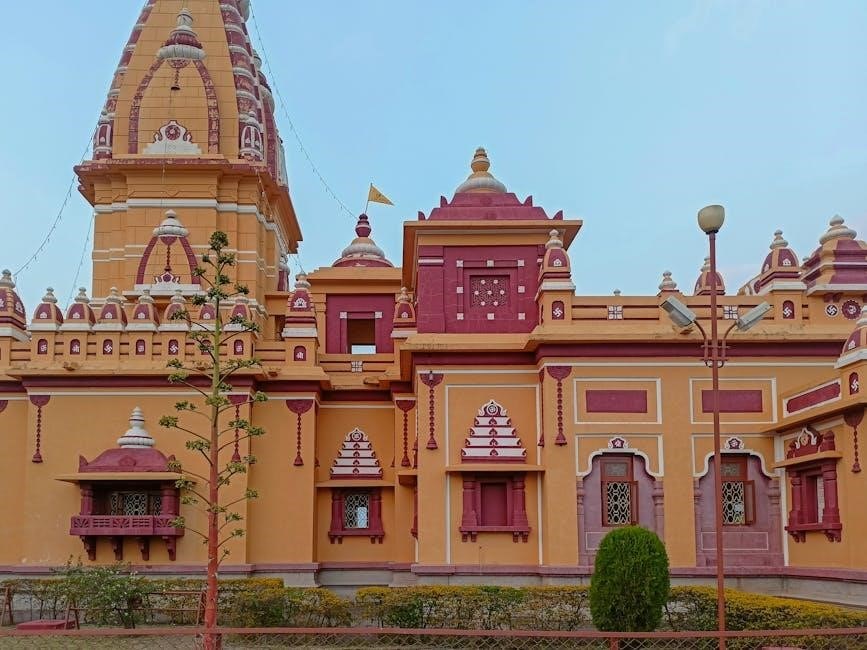
The Ashta Lakshmi Stotram is a revered Hindu devotional hymn dedicated to the eight forms of Goddess Lakshmi, symbolizing prosperity, wisdom, and spiritual growth. Composed in Telugu, it consists of eight verses, each praising a distinct aspect of Lakshmi, offering devotees a profound way to connect with her divine blessings and seek fulfillment in life.
Overview of the Ashta Lakshmi Stotram
The Ashta Lakshmi Stotram is a sacred Hindu hymn dedicated to the eight divine forms of Goddess Lakshmi, each representing a unique aspect of prosperity and well-being. Composed in poetic verse, the stotram is widely revered for its spiritual significance and is often recited during pujas and rituals. The Telugu version of the stotram is particularly popular, offering devotees a meaningful way to connect with Goddess Lakshmi’s blessings. It is structured into eight distinct verses, each highlighting a different form of Lakshmi, from wealth and knowledge to strength and progeny, making it a comprehensive prayer for seekers of divine grace and fulfillment.
Significance of the Stotram in Hindu Devotion
The Ashta Lakshmi Stotram holds profound significance in Hindu devotion, offering a powerful means to invoke Goddess Lakshmi’s blessings for prosperity, peace, and spiritual enlightenment. Devotees believe that chanting the stotram attracts positive energy, fostering wealth, knowledge, and familial harmony. Its Telugu version is particularly cherished in South India, especially during festivals and pujas. By reciting the stotram, believers seek to connect with Lakshmi’s divine grace, ensuring a balanced and fulfilling life. Its verses are considered potent tools for overcoming life’s challenges and attaining both material and spiritual success.

The Eight Forms of Lakshmi
The Ashta Lakshmi Stotram reverently describes eight divine forms of Goddess Lakshmi, each embodying unique virtues like wealth, knowledge, and strength. These forms are deeply revered in Hindu devotion, symbolizing her multifaceted blessings and universal appeal. The stotram’s Telugu version is widely cherished, offering devotees a sacred medium to connect with Lakshmi’s grace and seek her blessings for a fulfilling life.
Adi Lakshmi (The Primeval Lakshmi)
Adi Lakshmi, the primeval form of Goddess Lakshmi, is revered as the eternal and original source of all wealth and creation. She embodies the essence of divine energy and is often depicted as the consort of Lord Vishnu, symbolizing cosmic order and balance. In the Ashta Lakshmi Stotram, her verse highlights her role as the bestower of spiritual and material prosperity. Devotees worship Adi Lakshmi to seek her blessings for a harmonious life, prosperity, and liberation. Her grace is considered the foundation of all other forms of Lakshmi, making her a central figure in Hindu devotion and the stotram’s verses.
Dhana Lakshmi (The Goddess of Wealth)
Dhana Lakshmi, the goddess of wealth, is one of the eight forms of Lakshmi, symbolizing material prosperity and financial stability. In the Ashta Lakshmi Stotram, her verse emphasizes her role in bestowing wealth, good fortune, and abundance. She is often invoked by devotees to alleviate financial difficulties and to ensure a life free from scarcity. Dhana Lakshmi’s blessings are sought for success in business, agriculture, and all endeavors related to wealth creation. Her worship is believed to bring prosperity and happiness, making her a central figure in prayers for material well-being and economic success.
Dhanya Lakshmi (The Goddess of Grains and Food)
Dhanya Lakshmi, the goddess of grains and food, embodies agricultural prosperity and sustenance. She is revered as the provider of nourishment and fertility, ensuring abundant harvests and food security. In the Ashta Lakshmi Stotram, her verse highlights her role in sustaining life through the bounty of the earth. Devotees worship her to seek blessings for agricultural success, fertility of land, and ample food supplies. Her grace is believed to eliminate hunger and scarcity, fostering a life of plenty and gratitude. Dhanya Lakshmi’s blessings are essential for maintaining the natural balance and ensuring the well-being of communities.
Gaja Lakshmi (The Goddess of Elephants and Strength)
Gaja Lakshmi, the goddess of elephants and strength, symbolizes power, prosperity, and good fortune. Often depicted with elephants, she embodies royal opulence and divine strength. In the Ashta Lakshmi Stotram, her verse praises her as a protector and provider of courage. Worshippers seek her blessings for strength to overcome challenges and achieve success. Gaja Lakshmi’s elephants represent fertility and abundance, reinforcing her role in granting prosperity and sovereignty. Her worship is believed to bring resilience and determination, making her a revered form of Lakshmi in Hindu devotion and a symbol of unwavering strength and divine grace.
Santaan Lakshmi (The Goddess of Progeny)
Santaan Lakshmi, the goddess of progeny, is revered as the divine bestower of children and family happiness. She embodies the joy and fulfillment that come from nurturing a loving family. In the Ashta Lakshmi Stotram, her verse highlights her role in granting devotees the gift of offspring and ensuring their well-being. Worshippers pray to her for fertility, healthy children, and a harmonious family life. Santaan Lakshmi’s blessings are sought by those longing for parenthood, making her a cherished form of Lakshmi, symbolizing the divine grace of family and continuity.
Vijaya Lakshmi (The Goddess of Victory)
Vijaya Lakshmi, the goddess of victory, is the divine embodiment of triumph and success. She is worshipped for her power to grant courage, strength, and the ability to overcome challenges. In the Ashta Lakshmi Stotram, her verse extols her as the remover of obstacles and the bestower of victory in all endeavors. Devotees seek her blessings for success in personal and professional life, as well as spiritual conquests. Vijaya Lakshmi’s grace is believed to inspire determination and resilience, helping individuals achieve their goals and emerge victorious in life’s battles, making her a revered form of Lakshmi in Hindu devotion.
Vidya Lakshmi (The Goddess of Knowledge)
Vidya Lakshmi, the goddess of knowledge, embodies wisdom, intellect, and education. She is revered as the remover of ignorance and the bestower of enlightenment. In the Ashta Lakshmi Stotram, her verse highlights her role in granting clarity of thought and the pursuit of knowledge. Devotees worship her for academic success, intellectual growth, and the ability to discern truth. Vidya Lakshmi’s blessings are sought by students, scholars, and seekers of wisdom, making her a vital form of Lakshmi in fostering mental and spiritual enlightenment. Her grace illuminates the path to understanding and higher consciousness, enriching both worldly and spiritual endeavors.
Siddhi Lakshmi (The Goddess of Achievement)
Siddhi Lakshmi, the goddess of achievement, is worshipped for success in endeavors and the fulfillment of desires. She embodies the power to attain perfection and mastery in all aspects of life. Devotees seek her blessings for completing tasks, overcoming obstacles, and achieving both material and spiritual goals. Siddhi Lakshmi is often invoked by those striving for excellence in their pursuits, as her grace ensures the successful completion of efforts. Her significance lies in her ability to grant the ultimate fulfillment of aspirations, making her a revered form of Lakshmi in the quest for achievement and self-realization.

Benefits of Chanting the Ashta Lakshmi Stotram
Chanting the Ashta Lakshmi Stotram brings spiritual growth, material prosperity, and emotional well-being. It attracts wealth, wisdom, and success, while fostering inner peace and harmony in life.
Spiritual and Material Benefits
Chanting the Ashta Lakshmi Stotram offers profound spiritual and material benefits. Spiritually, it enhances inner peace, mental clarity, and devotion, fostering a deeper connection with Goddess Lakshmi. Materially, it is believed to attract wealth, prosperity, and good fortune, while improving financial stability and overcoming obstacles. Regular recitation is said to grant success in endeavors, strengthen relationships, and bring harmony to life. The stotram’s verses are also known to inspire wisdom, courage, and resilience, helping devotees achieve both worldly and spiritual fulfillment.
How to Maximize the Effects of the Stotram
To maximize the effects of the Ashta Lakshmi Stotram, chant it with dedication and focus during early mornings or Fridays, considered auspicious for Lakshmi worship. Maintain a pure heart and mind, ensuring concentration during recitation. Offer flowers, lamps, or sweets to Goddess Lakshmi to enhance devotion. Reciting the stotram 108 times or during Navratri is believed to amplify its benefits. Chanting in front of a Lakshmi idol or image creates a sacred atmosphere. Consistency and faith in the recitation are key to unlocking its spiritual and material rewards.

Downloading the Ashta Lakshmi Stotram in Telugu PDF
The Ashta Lakshmi Stotram in Telugu PDF is readily available online for free download. It includes the complete script and lyrics, making it easy to recite and follow. Platforms like stotranidhi.com and telugudevotionalswaranjali.blogspot.com offer direct downloads. Ensure authenticity by choosing reputable sources to maintain the sacredness of the text for spiritual practices.
Steps to Access the PDF Version
To access the Ashta Lakshmi Stotram in Telugu PDF, visit websites like stotranidhi.com or telugudevotionalswaranjali.blogspot.com. Search for “Ashta Lakshmi Stotram Telugu PDF” on the platform. Select the document from the search results and click the download button. Ensure the file is in PDF format and contains all eight verses in Telugu. Verify the source for authenticity to maintain the sacredness of the text. Once downloaded, you can print or save it for personal use or recitation during puja ceremonies. This convenient access allows devotees to cherish the divine hymns effortlessly.
Popular Platforms for Download
Devotees can download the Ashta Lakshmi Stotram in Telugu PDF from trusted platforms like stotranidhi.com, telugudevotionalswaranjali.blogspot.com, and archive.org. These websites provide authentic and free access to the document, ensuring the purity of the sacred text. Additionally, platforms like Google Drive and WhatsApp groups often share these PDFs within spiritual communities. Always verify the source to ensure the file is genuine and contains all eight verses in Telugu. These platforms make it easy for devotees worldwide to access and benefit from this divine hymn dedicated to Goddess Lakshmi’s eight forms.

Cultural and Religious Significance
The Ashta Lakshmi Stotram holds profound cultural and religious significance, being a cornerstone of Hindu devotion. It is often recited during pujas and rituals to invoke Goddess Lakshmi’s blessings, symbolizing prosperity, wisdom, and divine grace. The hymn’s verses are deeply rooted in Hindu spirituality, reflecting the reverence for Lakshmi’s eight forms and their universal appeal in seeking fulfillment. Its presence in Telugu PDF formats ensures accessibility for devotees, preserving its cultural heritage and spiritual essence across generations. It remains a vital part of Hindu liturgy and daily worship practices.
Role in Hindu Rituals and Pujas
The Ashta Lakshmi Stotram plays a vital role in Hindu rituals and pujas, often recited to invoke Goddess Lakshmi’s blessings for prosperity and spiritual growth. Devotees chant it during pujas, homas, and festivals like Navratri and Diwali, believing it attracts positive energy and wealth. The stotram is also used in daily worship to seek Lakshmi’s grace for material success and familial harmony. Its inclusion in Telugu PDF formats has made it easily accessible for devotees to recite during rituals, ensuring its cultural and liturgical significance endures. This practice strengthens the connection between devotees and the divine, fostering a deeper spiritual life;
Connection with Other Hindu Scriptures
The Ashta Lakshmi Stotram is deeply rooted in Hindu scriptural tradition, drawing inspiration from the Vedas and Puranas. It aligns with the Lakshmi Sahasranama and Lalita Sahasranama, which also glorify Goddess Lakshmi’s divine attributes. The stotram reflects themes of prosperity, knowledge, and spiritual fulfillment, echoing the teachings of the Upanishads. Its verses resonate with the Bhakti movement’s emphasis on devotion, making it a complement to broader Hindu textual traditions. This connection underscores its significance as both a devotional hymn and a scriptural resource for spiritual seekers.
The Ashta Lakshmi Stotram is a divine hymn celebrating Goddess Lakshmi’s eight forms, offering spiritual and material prosperity. Its Telugu PDF version is a cherished devotional resource.
Final Thoughts on the Ashta Lakshmi Stotram
The Ashta Lakshmi Stotram is a powerful devotional hymn that embodies the essence of Goddess Lakshmi’s divine grace; Its Telugu PDF version serves as a convenient and accessible resource for devotees, allowing them to chant and reflect on the eight forms of Lakshmi. By reciting this stotram, one can experience spiritual upliftment, material prosperity, and inner peace. It is a timeless prayer that fosters a deep connection with the divine, making it an integral part of Hindu devotion and daily worship.
Leave a Reply
You must be logged in to post a comment.